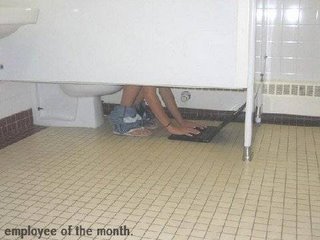Week 6 -- 8 November - Community

NOW THIS IS REAL DEDICATION TO YOUR JOB!!! (Vaun your cartoon reminded me of this…one of the reasons I avoid spending a lot of time online outside of work and school)
Reading:
"Communities in Cyberspace" - eReserve.
Chapter 18 and Conclusion, Winston.
Assignment:
What types of community have you experienced online? How have they differed from off-line communities? What characteristics of the Internet (the computing network) affect the growth, power, effectiveness of online communities?
The first online community I joined was my 4th grade classroom in 1995; we played an Oregon Trail game with everyone in the class. In middle school, I entered the world of email but only checked it by the prodding of friends who would tell me face-to-face “I sent you an email, open it!” In high school I never caught onto IM or Live Journal, the joke became if you want to get in touch with Stephanie, you better track her down personally…she’s not online and never answers her cell phone. Finally when I studied abroad I joined the group of IM users and our Euromasters email group. I joined Facebook and MySpace too with friends and relatives nagging; my 14-year-old cousin told me all her friends are online and if I am her friend then I need to have a picture, profile and music on MySpace, so she set me up with that. My 11-year-old cousin sends me online jokes. Even my mother and grandmother seem to check email more then me sending lots of forwards, links and videos from YouTube, information and more from their own email networks. Now I am linked to online spam groups!
Only through necessity (school, work and social pressure or time/distance issues) am I present in online communities. In that sense I feel old-fashioned, I have not been super active in many online communities but I am active in other groups within my community (Kiwanis, Sorority, Honor Societies, Politic & Law Groups etc.). For me, Winston’s comment may have some truth: “Beyond the hype, the Internet was just another network. This is to say its social effects could (and would) be as profound as, for example those of that far more ubiquitous network, the telephone. As profound…and as unrevolutionary (336).
However, when distance prevents face-to-face communication, online communities are great. They allow people to create loose and tight networks of friends, colleagues, acquaintances, stay in touch and even develop close relationships. I believe most people are impacted by face-to-face communication and an online community can be used to reinforce face-to-face communication (e.g. setting up meeting times or events in real life). I tried an online class once but quickly switched back to a normal classroom as I prefer a combination of communication interaction (face-to-face in addition to written and virtual).
Major differences I see online: (1) people write differently than they speak, (2) its easier to put up a façade online. Sometimes there is a place for written communication and other times spoken. Otherwise, online communities are similar to real-life communities, you only matter if you show up and participate. Like any communication, it has to be a habit. At the moment I have a habit of showing up more in face-to-face, online is just a habit I am lacking.
The Internet’s open characteristic and bridge through time and distance makes its development widespread – but its growth is only as continuous as humans will use it.

2 Comments:
Oh, the photo is so funny.
I think you got the point, that is the communities have been devided into those who use internet and those who don't, and become two world. I know that there are many people don't like to communicate with internet, they say it's not real. Indeed, while we meet by day, we still can chat online by night. But when we can't hear their sounds, it would not be true.
I think there are advantages and shortages in the online world. As for me, it is better way for me to live in both real and virtual worlds.
It's interesting to think about what things would be like if other technologies had resulted in the same kinds of communities you see online. I wonder if early telephone users would all get on their party line and have a nice chat (or talk dirty to each other, for that matter). I suppose ham radio was sort of like that. I agree with you--in the end, an online community is just another social group.
Post a Comment
Subscribe to Post Comments [Atom]
<< Home